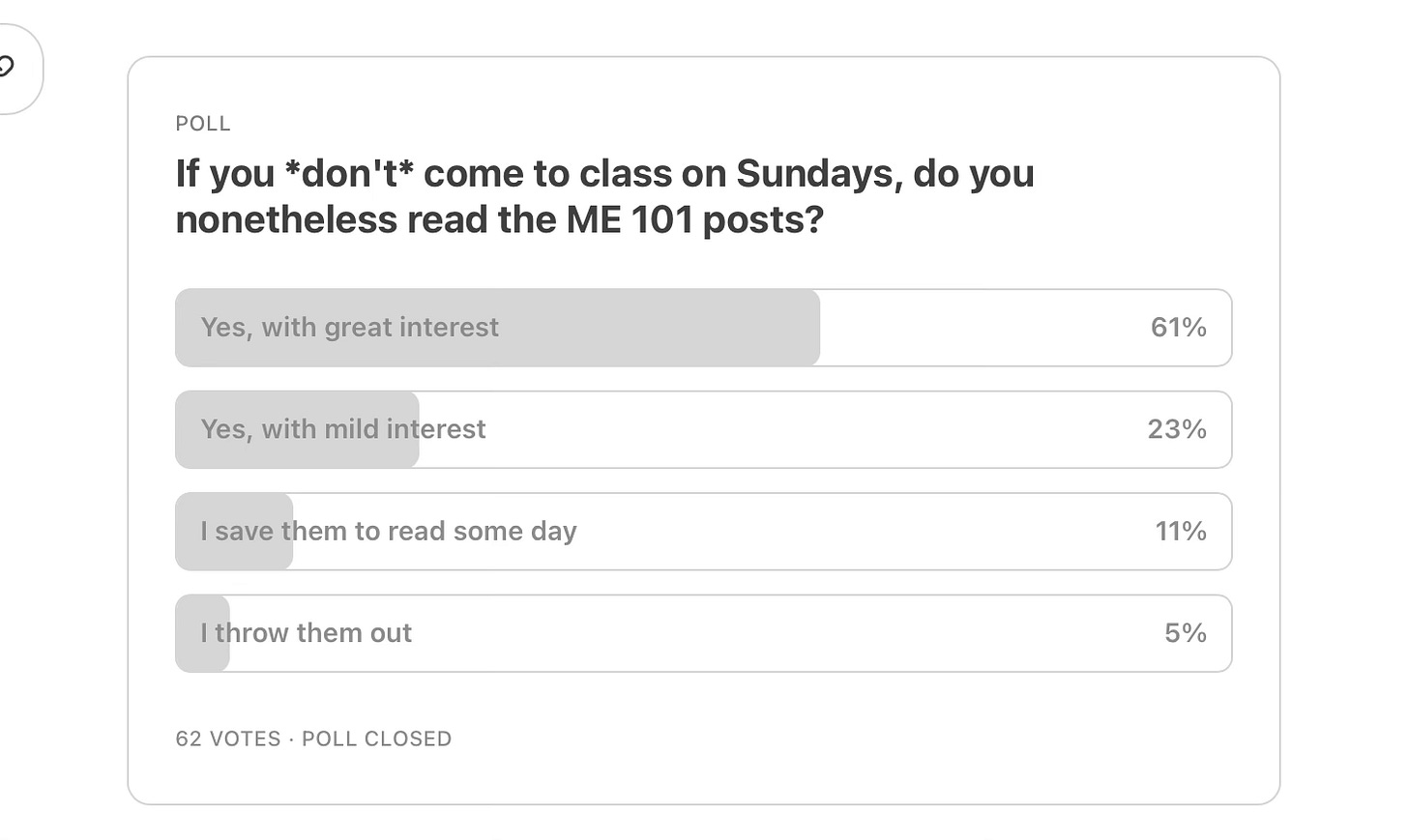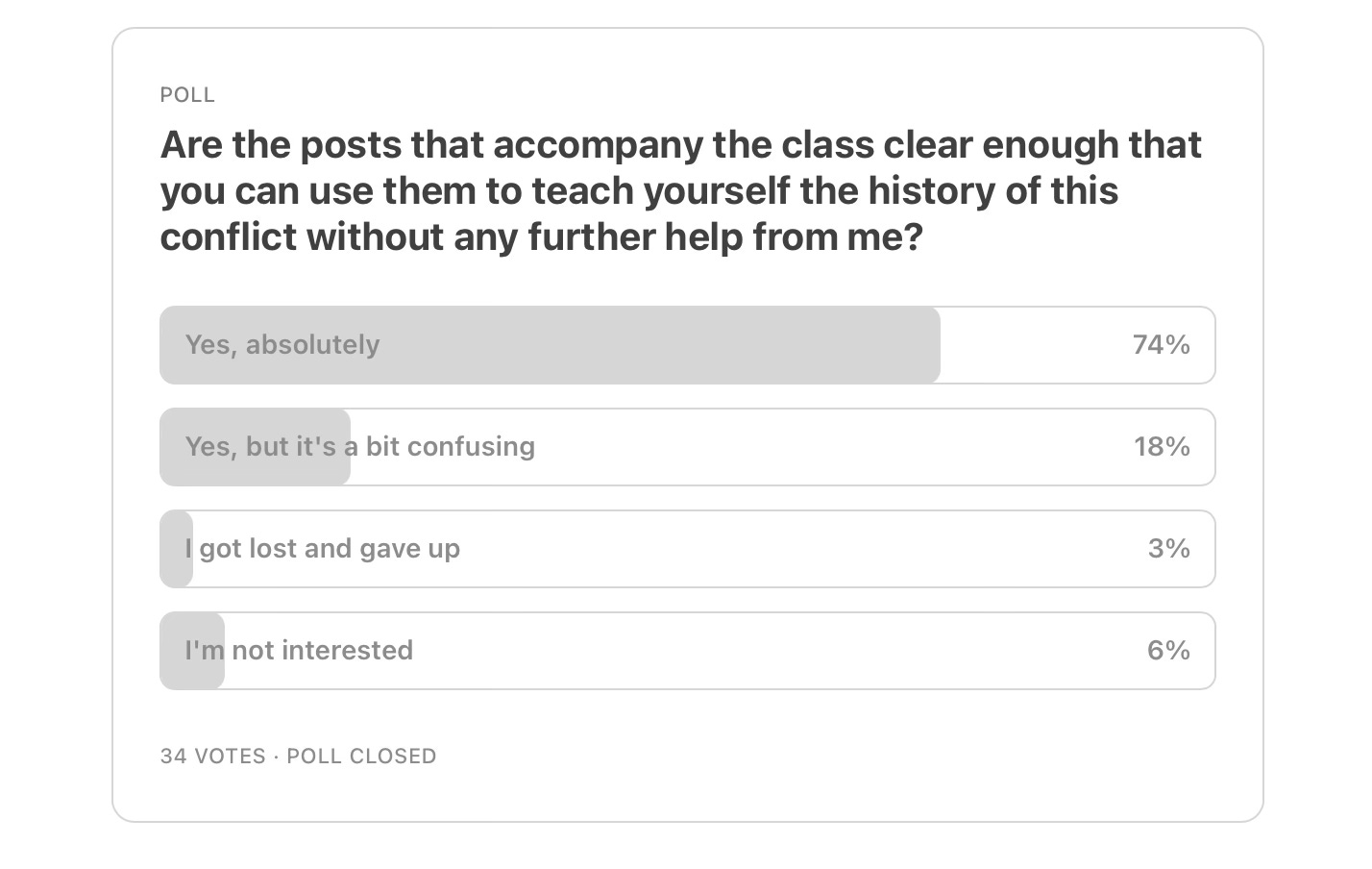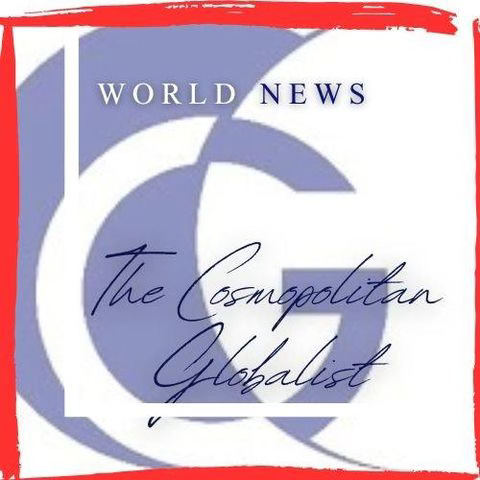WHAT IS MIDDLE EAST 101?
How to teach yourself the history of the Arab-Israeli conflict by using the posts in this section.

Many people don’t realize this, but I wrote my doctoral thesis, at Oxford University, about US foreign policy toward Israel and its neighbors. Subsequently, I taught Middle East 101 to undergraduates. I think my students emerged from that class well-prepared to make sense of the news from the Middle East right now. But I don’t see how anyone who didn’t take my class, or something equivalent to it, could possibly make any sense of it. Unless you know a fair bit of history—most of which isn’t taught at the high-school or the college level—the news emerging from Israel and Gaza could only be confusing.
It occurred to me that I could offer a useful benefit to my paid subscribers—and it might persuade free subscribers to become paid subscribers, too. So I asked: “When you read the news from the Middle East, do you have an uneasy sense that there are lots of things you should know, but don’t? Would you be interested in taking a class in the history of the Arab-Israeli conflict with me?”
I was overwhelmed by the positive response. I had no idea how many people feel exactly that way. So we did it! The class, so far, has been a hit beyond anything I’d hoped. I’ve never taught a more rewarding group of students.
The ME101 tab is for subscribers who can’t make it to the discussion sessions, but nonetheless want to teach themselves the history of the Arab-Israeli conflict. (Note: This is not, properly speaking, an introduction to the history of the Middle East; it’s an introduction to the history of the Arab-Israeli conflict, which isn’t the same. Perhaps one day we’ll offer a class in the history of the Middle East. But for now, this class is focused on just one part of that history.)
I’ve assigned several hours’ worth of readings every week, with an emphasis on primary source documents. Most of the reading is either available for free on the Internet or available at a very low cost. The class is designed with that in mind; I know many readers don’t have access to a university library, and I didn’t want the cost of the reading to be an obstacle to participating.
Our class has convened every week, by Zoom, for a (very) lively discussion of the week’s readings. This discussion sessions are only for people who’ve done the reading, so we always have a well-informed conversation. Afterward, I post our discussions here—in both video and podcast format—so that you can follow along.
We’ve also had terrific guests come to join our discussions. I’ve posted those videos here, too. Israeli Ambassador Michael Oren, for example, joined us to talk about his classic book about the Six Day War, and Oren Kessler came to discuss his book, Palestine 1936, which treats the Arab uprising and the roots of the current conflict. These were some of the best conversations we’ve had.
We’ve either covered or will soon cover the following topics. (This is not an exhaustive list.)
Herzl, Weizmann, and Zionism
The pre-1948 Ottoman and British Mandate period
The Basle Program and the First Zionist Congress
The McMahon Letter
The Sykes-Picot Agreement
The Balfour Declaration
The Weizmann-Feisal Agreement
The Churchill White Paper
The 1936-39 Arab Revolt
The Peel Commission
The 1939 White Paper
Qutb and the Muslim Brotherhood
The UN Partition Plan
The establishment of the State of Israel
The 1948 War
The Palestinian refugee crisis
The Law of Return
The Suez War
The birth of the PLO
The Six-Day War
Resolution 242
The Khartoum Resolutions
The War of Attrition
Black September (the civil war)
Black September (the terrorist group)
The Rogers Plan
The Yom Kippur War
Kissinger’s shuttle diplomacy
Resolution 338
Sinai I and II
The Palestinian National Charter and Fatah
Camp David
The birth of Hamas
The Fahd Plan
The Lebanon Wars
The Iranian Revolution
The rise of Hezbollah
The First Intifada
Oslo
The Washington Declaration
James Baker’s Five-Point Plan and Israel’s Peace Initiative
The Second Intifada
The Wye River Memorandum
The Sharm el-Sheikh Memorandum
The Taba Summit
The Arab Peace Initiative
The Gaza disengagement
The role of surrounding Arab states and Iran
If you’re looking at that list with dismay and thinking, “I have no idea what those terms mean,” or “I think I remember that, but I can’t remember why,” this class would be useful to you. Once you know at least a little bit about each of those entries, everything you read in the news will make much more sense—and this, I promise.
It’s too late to join the discussion group, though we may do this again in the future. But many of our readers have been following along on their own, and most of them say that this works very well:
If you’d like to take the class too, you’ll find everything you need to do that in this section, which is organized chronologically: reading lists, study guides, study questions, lectures, videos, and more. Scroll down and start with Week One. (I wouldn’t advise jumping around, because later lessons build on earlier ones.)
Don’t hesitate to ask me if you have questions about anything at all in this material. This archive is a benefit for our paying subscribers. If you’re a paying subscriber, this is meant for you, and I want you to get the most out of it that you can. So don’t hesitate to ask.
I have a suggestion, too. I know that since October 7, many people have fallen out with friends and even family over the war in Gaza. I can see for myself how many people are driving themselves mad by arguing about it on Facebook and Twitter—and I can also see how starkly uninformed most of these arguments are.
If you have someone in your life whose opinions about Israel, Gaza, or any aspect of this conflict are driving you nuts, why not give them a gift subscription to the Cosmopolitan Globalist? I promise you that if you give me your ignorant uncle for two months, I’ll send him back to you much better informed.
A class like this, not arguments on Facebook, is the antidote to ignorance and simplistic slogans. Save yourself the trouble of arguing and let the Cosmopolitan Globalist sort him out. If that’s not worth the price of a subscription, I don’t know what would be.








Sorry I missed it. My slow time is January to March.
I just subscribed so I can take the class. Please sign me up. I've spent the last few days in conversation with Chat GPT 4 trying to understand the hot mess we're all in now in the ME. I've learned a lot. Hopefully, the bot is telling me the truth as best it can be known. I'll use the class to fact check the GPT bot. :-)